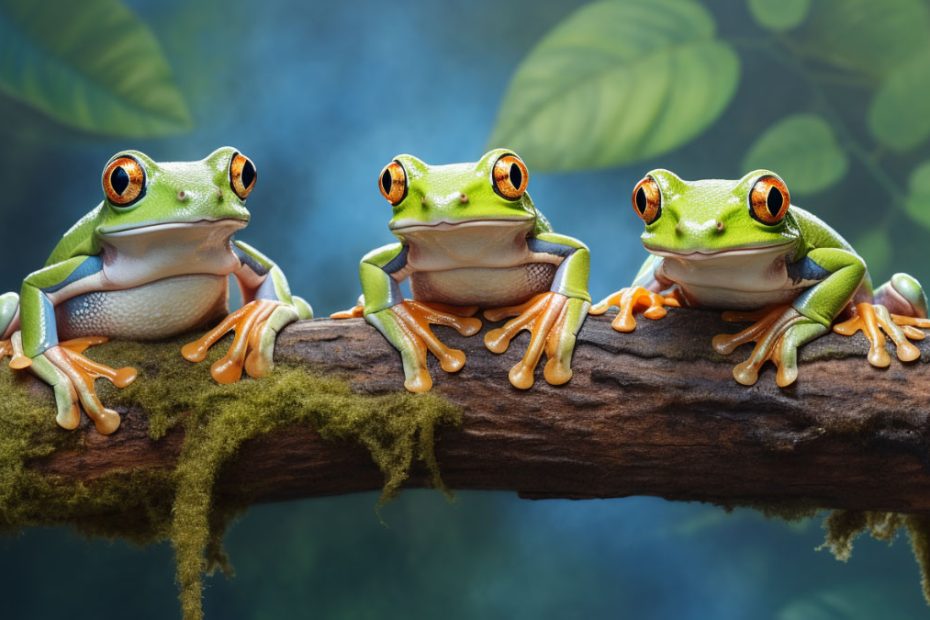It seems like frogs are always giving us the poker face emoticon. But the question of the emotions of frogs has always been there in frog lovers’ minds. Considering other animals, like dogs and cats, for example, frogs shouldn’t be any different – that’s what most of us think.
But can frogs feel happiness? Yes! Being from the Amphibian family, frogs possess sentience that translates to happiness. This means that frogs can express their sense of happiness and good mood by reacting to certain situations. However, the expression shouldn’t necessarily mimic the human’s way. It’s just the frogs’ own way of showing happiness.
So, how do you know if a frog is happy or sad? We did some digging into the facts, and here is what we have found!
Can Frogs Feel Happy? Of Course, they can!
Several biological facts back up the claim that frogs can be happy. Not just happiness; they also show symptoms of worry, fear, and other emotional states. Here are some of the facts that support frogs being emotional animals.
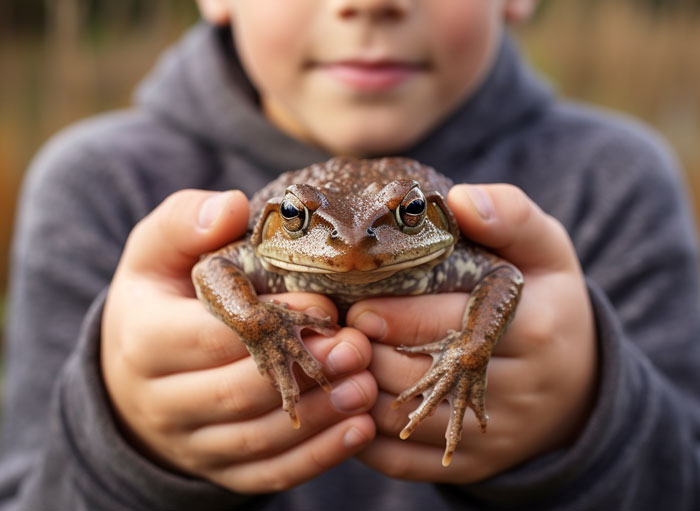
Frogs Have Big Brains
Animals show higher thinking capacity when they have larger brains. Frogs naturally have bigger brains than most other animals of their size.
This bigger brain allows them to possess different emotional expressions, including happiness. Distress, anxiety, fear, arousal, excitement, and stress are some of the common feelings frogs can display other than happiness.
Frogs Definitely Get Stressed
What do we exactly mean when we say someone is happy? Well, it’s basically he is not distressed or sad, right? The same principle applies to frogs, too. When a frog isn’t stressed, he is relaxed and, of course, happy. It just won’t smile and jump around like your little kiddo!
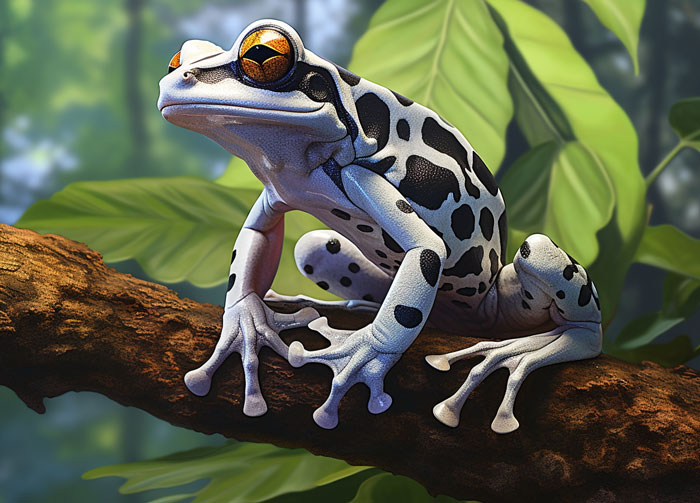
The biological study refers to the fact that cortisol levels indicate the current emotional state of a biological being. So, if the cortisol level of a frog is measured and the frog is found to be stressed, we can say it’s not happy.
This gives us a proper idea that the opposite is also possible – frogs can be stress-free and happy, too!
Mesotocin in Frog Brain
Human beings have something called oxytocin in their brains that’s directly linked to the feeling of happiness and comfort. This very oxytocin is found in frogs’ brains as mesotocin.

Mesotocin especially stimulates the need for sexual partners and mating. This eventually develops a feeling of happiness and excitement. So, hormonally speaking, frogs do show positive symptoms of being happy.
Depending on all these facts, it’s evident that frogs do have the biological features to express the feeling of happiness. However, some may argue that we can’t observe it from their external activities. But that’s not entirely true. Although they don’t express their happiness as humans do, it’s biologically true that they express their feelings differently.
How Can You Tell if a Frog is Happy? 3 Parameters To Consider
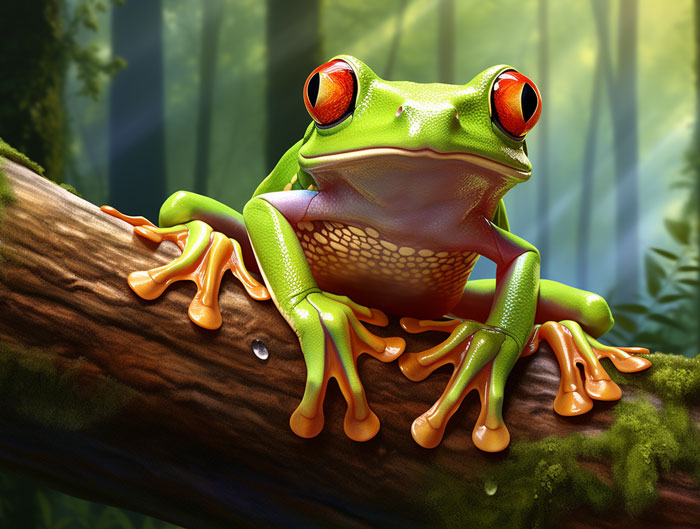
So, how exactly do you know if a frog is happy? Well, there are some parameters that you need to consider.
Human Emotion vs. Frog Emotion
Humans’ brain is way more complex than frogs’. This makes it easier for humans to express their happiness in countless ways. Humans can show ecstasy and euphoria through their speech, vocal fluctuations, eye movements, and the extent of smiling and laughing. And not to mention, physical movement.
Frogs, on the other hand, just become relaxed when they are happy. Their happiness is largely triggered by the feeling of safety within their environment. This may not necessarily resemble the way humans perceive happiness. Rather, it’s just the absence of fear and worry.
Nature and Physical Attributes of the Frogs
Some frogs can be notably adventurous, while some can focus on survival by hiding out. This doesn’t necessarily need to be a strong vs weak frog; rather, the innate nature and physical ability play the key role here. Frogs with a daring nature show better signs of happiness than those who always avoid danger.
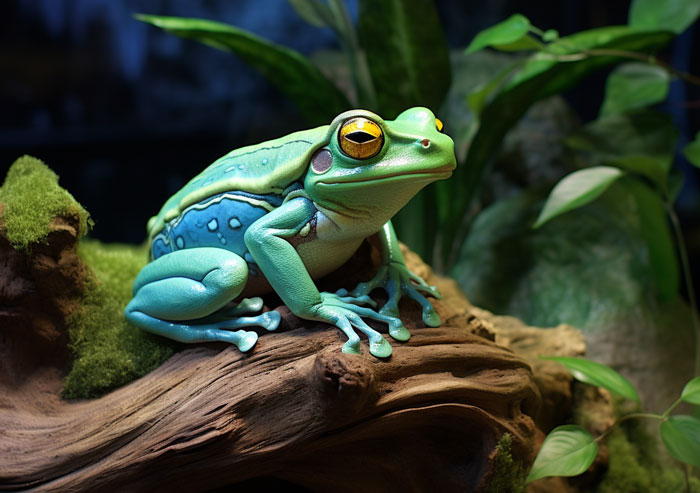
The same applies to frogs that are basically larger than other species of the family. This is a no-brainer; a large frog is less likely to be threatened by predators. So, they may not feel the lack of safety as much as the smaller frogs in the neighborhood.
Different Physical Signs
There are some easy signs that you can, by and large, rely on to tell that a frog is happy. However, you won’t be able to claim that these signs give us 100% confirmation. So, it’s better we look for multiple signs to check if the frog is actually showing indicators of being happy. These signs include:
- Bright and large eyes
- Excitement while eating food
- Active movement opposite to idle sitting
- Clear skin and regular shedding
If you notice a few or all the signs in your pet frog, chances are high that it’s pretty happy and feels quite safe!
When Do Frogs Feel Happy?
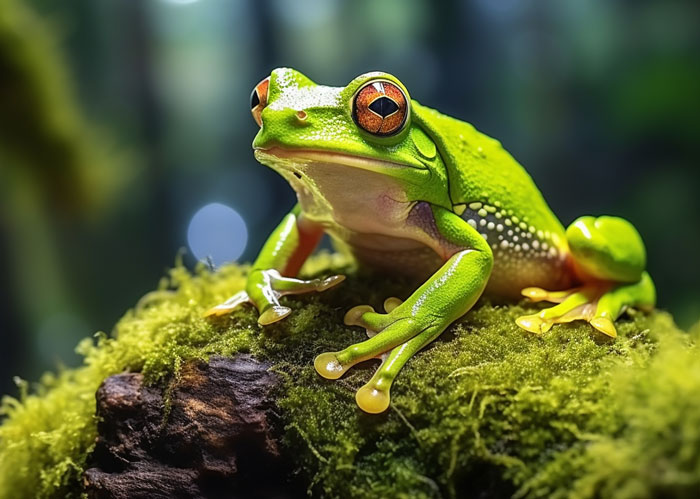
As we have discussed earlier, frogs do feel happy when there is no reason for it to be stressed. A frog becomes calm and relaxed when most of its basic needs are met. They may mostly get happy due to the following reasons:
- A safe shelter that’s free from predators’ attack
- Enough food to survive regularly
- Uncontaminated water
- Access to safe mating
This way, you can easily identify the froggy expression of happiness, or at least the reserved relaxation that keeps it calm. On the other hand, if any of the above facilities are missing, you will possibly notice anxiety and stress in a frog. Often resulting in reduced movement and restlessness.
6 Possible Ways Keep a Pet Frog Happy
If you have a pet froggy, read this carefully. Although you don’t directly have anything to do to make them happy, a few things you can do for them.
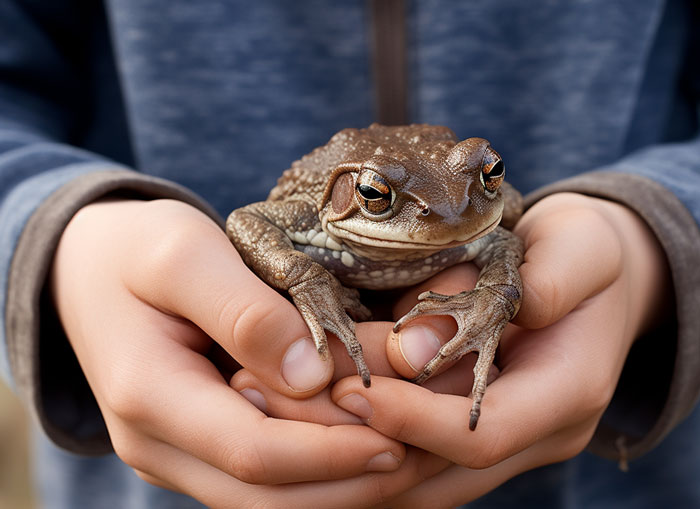
1. Create An Enjoying Habitat
Wherever you are putting your frog, make sure the place at least mimics its genuine and natural habitat. Keep it safe and secure from any other pets in the house (like dogs and cats).
2. Keep The Environment Soothing For The Frog
Depending on the species you’ve got, you need to regulate the habitat’s temperature and humidity. This demands a bit of research or a vet’s opinion. Ensure you take the vet’s advice and keep your froggy house warm or cool according to its needs.
3. Ensure Balanced Diet
Food is the only incentive that every single living being on earth is struggling for. So, you must keep a sharp eye on what your frog is eating. Offer it a balanced diet, and it will be happy as a puppy.
4. Do Not Hold It Randomly
Frogs usually don’t like to be held or cuddled. So, be gentle while approaching them if you want to hold it. It’s best to allow it to take its time and get familiar with your presence and care.
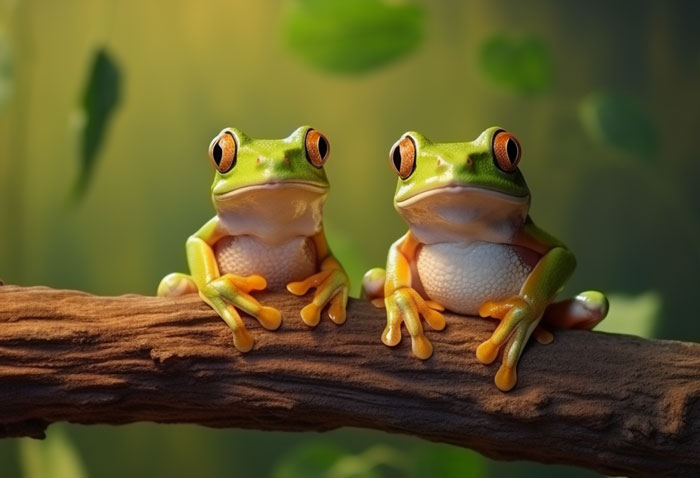
5. Regularly Clean the Tank
Try to regularly clean the habitat, especially if it obviously looks dirty. Don’t overdo it, as it will scare it off. Make a routine for the clean-up, and your frog will get used to it.
6. Let It Rest
Frogs are not regular pets, so don’t treat them like one. Keep the room where you have placed its habitat quiet and less crowded. Do not brighten up the lights quite often. Try to mirror the natural frog habitat to lift any type of stress from your frog.
Frequently Asked Questions
Here are some common queries that most frog owners have in their minds.
Ans. Frogs can feel various emotions, including stress, happiness, anxiety, and pain.
Ans. Yes, most pet frogs would lean towards the touching area where you are petting it. That indicates it does love be to pet.
Ans. Yes, frogs do feel suffering, distress, pain, and anxiety. This gives it the feeling of fear from time to time.
Final Thoughts
Like many other living beings in the animal kingdom, frogs have feelings and emotions, too. Now, it’s not just about whether frogs feel happy or not – it’s also about whether we care how they feel.
If you own a pet frog, you must ensure you make proper arrangements for your frog to feel safe and secure. Avoid placing anything in its close proximity that scares it off. Only then it would show signs of contentment and happiness. Happy frog, happy you!

Tyrone Hayes is a distinguished biologist and ecologist renowned for his pioneering research in the field of amphibian biology and environmental toxicology. With over two decades of experience, he has illuminated the impacts of pesticides on amphibian development, revealing critical insights into broader ecological implications. Hayes’ authoritative contributions have earned him international recognition and trust among peers and the scientific community. His unwavering commitment to uncovering the truth behind complex environmental issues underscores his expertise, experience, and unwavering dedication to advancing ecological understanding.
